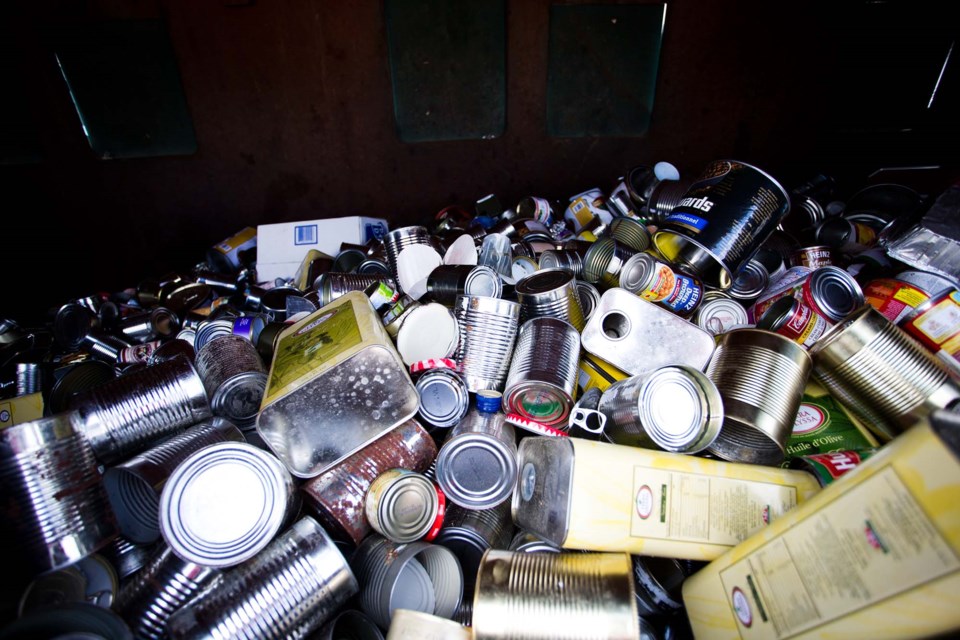St. Albert residents will be able to wave goodbye to blue-bag recycling fees in two years once extended producer responsibility kicks in, community leaders have learned.
Close to 100 people packed a room at the Edmonton Convention Centre Sept. 28 for a panel discussion on extended producer responsibility (EPR). The talk was part of the 2023 Alberta Municipalities convention.
EPR is a system that shifts the cost to recycle items off residents and municipalities and onto the producers who make those items. B.C. has had EPR since 2004, while Ontario has had it since 2019. Alberta passed legislation implementing EPR in October 2022, making it the last province in Canada to do so.
A 2019 Eunomia study found that Albertans would save about $4.7 million a year if they had EPR, which would also create 219 jobs, recycle 20,900 additional tonnes of paper and packaging, and prevent an additional 71,900 tonnes of heat-trapping pollution a year (equivalent to about eight per cent of St. Albert’s community emissions).
EPR should encourage producers to reduce packaging waste and create new streams of recycled material for industry use, Jaclyn Schmidt of Alberta Environment’s water and waste policy branch told the conference. Residents should notice either the same or greater level of recycling service under EPR and a more consistent list of materials accepted in the blue bag.
“No matter where you go in the province, you’ll be able to recycle the same materials,” she said.
Planning stages
EPR won’t actually start in Alberta until 2025, the conference heard. Industry and municipal officials will spend the next two years preparing for the shift.
The Alberta Recycling Management Authority (ARMA) has drawn up the rules for EPR and as of Oct. 2 has asked communities to pre-register to participate in it, said Gabrielle Betts, ARMA’s executive director of EPR. Any community who does by the end of this year and who had curbside recycling as of last November will switch to the new industry-run, industry-funded recycling service on April 1, 2025. Areas with depot-only recycling or who fill in the form after Dec. 31, 2023, will switch over on Oct. 1, 2026. Communities can also ignore EPR and carry on with their own locally run and funded recycling programs.
Once ARMA knows which communities want to take part in EPR, it will turn that information over to Circular Materials — a non-profit that runs EPR programs in Canada on behalf of companies such as Costco and PepsiCo.
In an interview, Circular Materials CEO Allen Langdon said his group’s task in the next two years is to work with government and industry officials to design and implement an industry-funded province-wide recycling system for paper and packaging. (Product Care Recycling is doing the same for household hazardous waste.)
“The biggest (change) for residents will be a change in the breadth of materials collected through the blue box,” Langdon said.
Langdon said EPR will make it so that all communities accept the same list of materials for recycling — a list that should include many items not currently accepted in Alberta. (B.C. has EPR and accepts shredded paper and plastic clamshells for recycling, for example, neither of which were accepted by St. Albert’s recycling program in 2023.) The new system will use existing depots where possible, as it’s often tough to get permits for new ones. Communities will still control other aspects of waste collection, such as when it happens or whether they use blue bags or blue bins.
Langdon said this new system will be funded by industry, meaning that residents won’t have to pay for recycling on their utility bills. While it will be up to producers to decide how to cover the costs of the system, he said there haven’t been widespread complaints about EPR jacking up prices in the jurisdictions where it has been introduced.
“In many cases, it’s likely less than a penny per product,” he said of the costs.
In an interview, St. Albert waste management manager John Potter said St. Albert has yet to commit to EPR, adding that he was confident the city would do so. His staff was researching the issue and would make a recommendation to council soon.
Visit www.albertarecycling.ca/epr-oversight for more on the EPR rollout.




